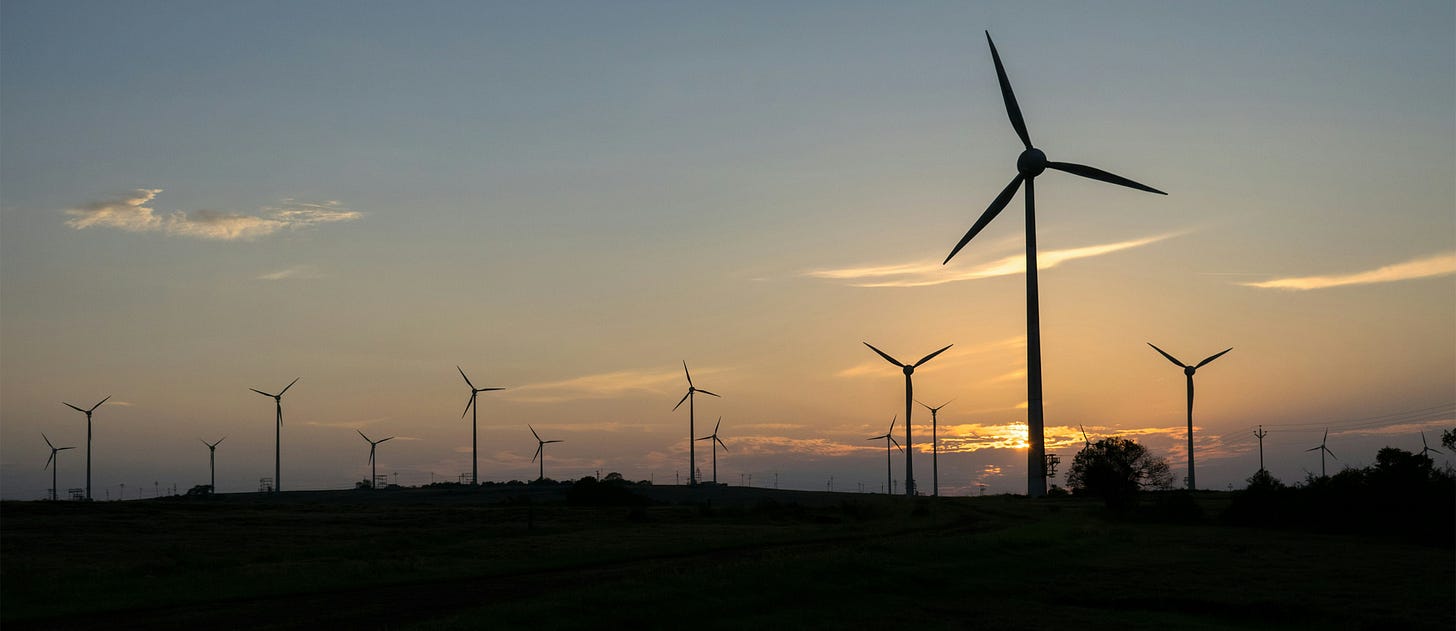Put your money where your values are
Battery storage for the win, fossil fuel lobbyists at COP29, and consider where you bank
GOOD NEWS
At COP29, six countries have committed to increasing their energy storage capacity six times by 2030. That’s in addition to the 133 countries who promised to double it over that time period - and the U.S. is already going to do that by the end of 2025.
In the past four years, the United States added 20 gigawatts of battery storage capacity to the grid. For comparison, that’s enough to store the output of 20 nuclear reactors (but at much lower cost) —and that number could double to 40 gigawatts by the end of next year, according to the Energy Information Administration. Most of that growth occurred in California, Arizona, and Texas.
Battery capacity means that solar and wind power can be stored for when the sun isn't shining and the wind isn't blowing, guarding against blackouts. “We can leverage that stored energy and dispatch it when we need it,” Patti Poppe, CEO of PG&E, California's biggest utility company, told Bloomberg.
"The renewable energy boom has become something much more than just a way to reduce carbon emissions. It has become a pathway to prosperity," writes meteorologist Eric Holthaus. "Now that renewable energy is the world’s cheapest energy source, it transforms the politics around a key piece of climate action. Wind and solar are not just for fringe environmentalists. They’re for everyone. The renewable revolution is inevitable."
NOT-SO-GOOD NEWS
COP29 is wrapping up in Baku, Azerbaijan, under the cloud of the chief executive being caught promoting fossil fuel deals—at a summit where countries are meant to be discussing how to phase out fossil fuels.
Badges to attend the meeting are strictly rationed and hard to come by, so it’s appalling to hear that the host country also provided at least 123 badges specifically to oil and gas representatives—bringing the total number of fossil fuel lobbyists at COP29 to a stunning 1,770 attendees. For comparison, that’s nearly double the number of delegates from the 10 most climate-vulnerable nations combined.
Burning coal, oil, and gas is responsible for three-quarters of global warming, not to mention the air pollution that kills more than 8 million people per year. That’s more deaths every year from burning fossil fuels than all the deaths that have occurred due to COVID-19 since the beginning of the pandemic, according to the World Health Organization
Global carbon emissions are set to tick up 0.8 percent in 2024 compared to last year, according to the annual global stocktake. But Gernot Wagner, an economist at Columbia University and a previous guest curator of this newsletter, still highlights some good news. EU emissions dropped 3.8 percent this year, U.S. emissions dropped 0.6 percent, and Chinese emissions only rose 0.2 percent. This is, he wrote on Bluesky, "not anywhere near where the world needs to be—at zero emissions—but 2nd & 3rd derivative are pointing in the right direction."
WHAT YOU CAN DO
Your choice of where to bank can be a surprisingly powerful tool in the fight against climate change. An analysis last year found that just $1000 in a bank account that invests in fossil fuels can generate the equivalent carbon emissions of a trans-continental flight every year.
The 60 largest private banks globally have provided $6.9 trillion in financing for fossil fuels since the Paris Accord was signed in 2016, according to the latest "Banking on Climate Chaos" fossil fuel finance report.
I’m going to be honest, though: this is a big ask. As this article explains, depending on where you live, finding a climate-friendly bank might mean it doesn’t have physical branches; if you need one, looking for a local credit union could be easier.
I’ve already tried to make the switch once, and it didn’t work out—but it’s on my list to get sorted out soon, as the local bank we use isn’t rated well by Bank Green. I’ll be using their recommendations and those of Bank for Good to find a better option. Join me?
Sun., Dec. 1st at 4pm ET - My talk with the American Conservation Film Festival - in person in Shepherdstown, West Virginia
Wed., Dec. 4th at 7pm ET - Building Hope in a Warming World with Dickinson College - in person at the ATS Auditorium and live-streamed online






The banking is hard, and I'm sure Chase isn't innocent 😬 But our local Chase banks in Indianapolis are some of the only businesses around here with solar panels!
Love the banking action! I moved my savings over to Ally a few years back, and they still have plenty of convenient online features. Also good to remember that banks can't really do anything with your checking account. So if a big bad bank is the only one near you, you can always use them for checking and move money from your "good" bank as needed digitally.